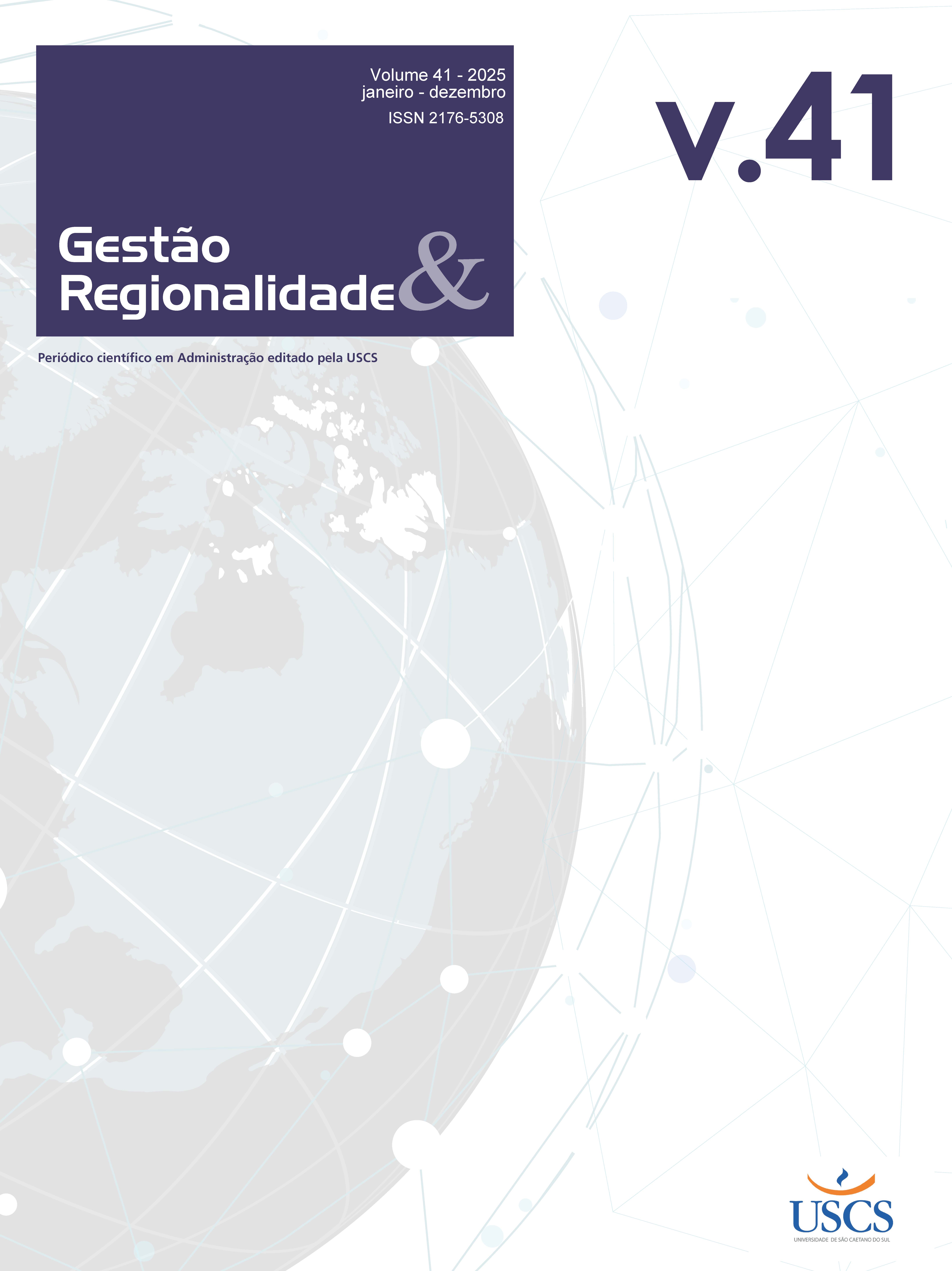BLUEWASHING: APRECIAÇÃO DO ESTADO DA ARTE
DOI:
https://doi.org/10.13037/gr.vol41.e20258725Palavras-chave:
Falso discurso mercadológico, Bluewashing, Produção acadêmicaResumo
O trabalho teve como objetivo avaliar a produção acadêmica sobre o termo bluewashing. Para tanto, foi realizado um levantamento bibliográfico, associado a uma análise crítica, visando as publicações acadêmicas sobre o termo bluewashing nas bases de dados científicas reconhecidas mundialmente (Proquest, Web of Science, Capes, Scopus, Scielo e Spell). Isso permitiu um mapeamento geral do que foi produzido sobre o assunto, tanto qualitativa quanto quantitativamente, não só para consolidar o que foi estudado até então, mas também para possibilitar uma análise crítica para avançar o tema na academia e na prática. Assim, foi possível perceber que o tema bluewashing, apesar de responder por uma produção relevante, ainda é pouco estudado pela academia, principalmente em profundidade, ou mesmo de forma integrada e consensual. Diante disso, várias discussões foram feitas e novos estudos incentivados.
Downloads
Referências
Abdelzaher, D., Fernandez, W. D., & Schneper, W. D. (2019). Legal rights, national culture and social networks: Exploring the uneven adoption of United Nations Global Compact. International Business Review, 28(1), 12-24.
Acquier, A., Gond, J. P., & Pasquero, J. (2011). Rediscovering Howard R. Bowen's legacy: The unachieved agenda and continuing relevance of social responsibilities of the businessman. Business & Society, 50(4), 607-646.
Amer, E. (2018). The Penalization of Non-Communicating UN Global Compact's Companies by Investors and Its Implications for This Initiative's Effectiveness. Business & Society, 57(2), 255-291.
Andreoli, T. P., Costa, E. D. S., & Prearo, L. C. (2022). Consumer Judgment on the Practice of Greenwashing: Scale Development and Validation. BBR. Brazilian Business Review, 19, 508-524.
Andreoli, T. P., & Batista, L. L. (2020). Possíveis ações regulatórias do greenwashing e suas diferentes influências na avaliação de marca e no julgamento dos consumidores. Revista Brasileira de Marketing, 20(1), 29-52.
Andreoli, T. P., & Nogueira, A. C. V. (2021). Falsos discursos mercadológicos. Revista Pensamento Contemporâneo em Administração, 15(2), 69-87.
Andreoli, T. P., Crespo, A., & Minciotti, S. (2017). What has been (short) written about greenwashing: A bibliometric research and a critical analysis of the articles found regarding this theme. Revista de Gestão Social e Ambiental-RGSA, 11(2), 54-72.
Berliner, D., & Prakash, A. (2015). "Bluewashing" the Firm? Voluntary Regulations, Program Design, and Member Compliance with the United Nations Global Compact. Policy Studies Journal, 43(1), 115-138.
Bowen, H. R. (1953). Social Responsibility of the Businessman. New York: Harper and Row.
Carroll, A. B. (2021). Corporate social responsibility: Perspectives on the CSR construct's development and future. Business & Society, 60(6), 1258-1278.
Carroll, A. B. (1999). Corporate social responsibility: Evolution of a definitional construct. Business & society, 38(3), 268-295.
Hu, H., Dou, B., & Wang, A. (2019). Corporate Social responsibility information disclosure and corporate fraud — "risk reduction" effect or "window dressing" effect? Sustainability, 11(4), 1141.
Krause, F., & Haunschild, A. (2018). Voluntary Cooperation Between NGOs and Corporations from the Perspective of German Trade Unions: A Micropolitical Analysis. Organization & environment, 31(2), 95-112.
Linton, A. (2008). A niche for sustainability? Fair labor and environmentally sound practices in the specialty coffee industry. Globalizations, 5(2), 231-245.
Manetti, Giacomo, and Simone Toccafondi. "The role of stakeholders in sustainability reporting assurance." Journal of business ethics 107 (2012): 363-377.
Pomering, A., & Johnson, L. W. (2009). Constructing a corporate social responsibility reputation using corporate image advertising. Australasian Marketing Journal, 17(2), 106-114.
Pope, S., & Wæraas, A. (2016). CSR-washing is rare: A conceptual framework, literature review, and critique. Journal of Business Ethics, 137, 173-193.
Sun, Y., & Shi, B. (2022). Impact of Greenwashing Perception on Consumers' Green Purchasing Intentions: A Moderated Mediation Model. Sustainability, 14(19), 12119.
Szilagyi, A., Cioca, L. I., Bacali, L., Lakatos, E. S., & Birgovan, A. L. (2022). Consumers in the circular economy: A path analysis of the underlying factors of purchasing behaviour. International Journal of Environmental Research and Public Health, 19(18), 11333.
Zharfpeykan, R. (2021). Representative account or greenwashing? Voluntary sustainability reports in Australia's mining/metals and financial services industries. Business Strategy and the Environment, 30(4), 2209-2223.
Downloads
Publicado
Edição
Seção
Licença
Direitos autorais (c) 1969 Taís Pasquotto Andreoli (Autor)

Este trabalho está licenciado sob uma licença Creative Commons Attribution-NonCommercial-NoDerivatives 4.0 International License.
Autores que publicam nesta revista concordam com os seguintes termos:
- Autores mantém os direitos autorais e concedem à revista o direito de primeira publicação, com o trabalho simultaneamente licenciado sob a https://creativecommons.org/
licenses/by-nc-nd/4.0/, permitindo o compartilhamento do trabalho com reconhecimento da autoria do trabalho e publicação inicial nesta revista. - Autores têm autorização para assumir contratos adicionais separadamente, para distribuição não-exclusiva da versão do trabalho publicada nesta revista (ex.: publicar em repositório institucional ou como capítulo de livro), com reconhecimento de autoria e publicação inicial nesta revista.
- Autores têm permissão e são estimulados a publicar e distribuir seu trabalho online (ex.: em repositórios institucionais ou na sua página pessoal) a qualquer ponto antes ou durante o processo editorial, já que isso pode gerar alterações produtivas, bem como aumentar o impacto e a citação do trabalho publicado (Veja O Efeito do Acesso Livre).




















